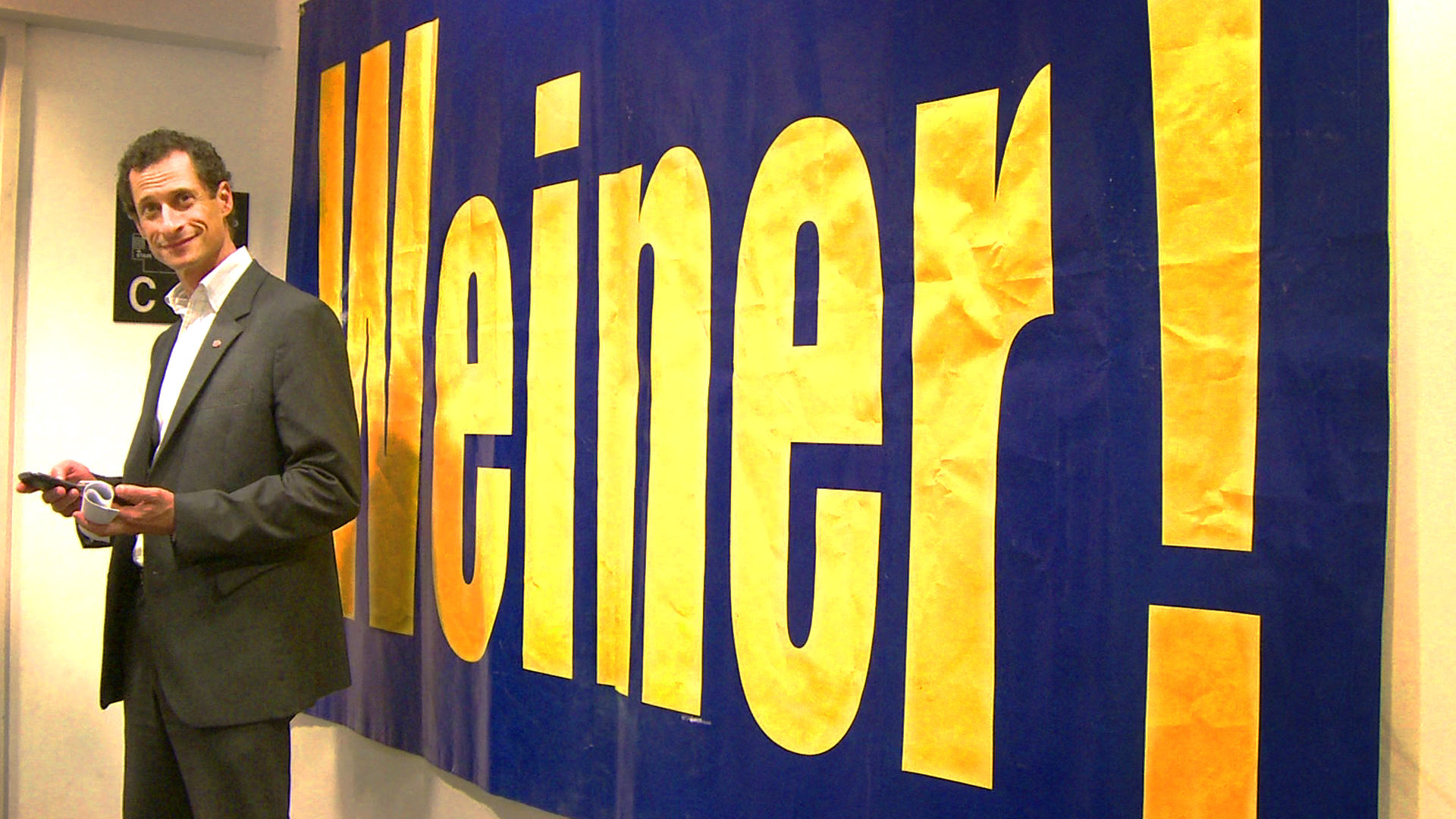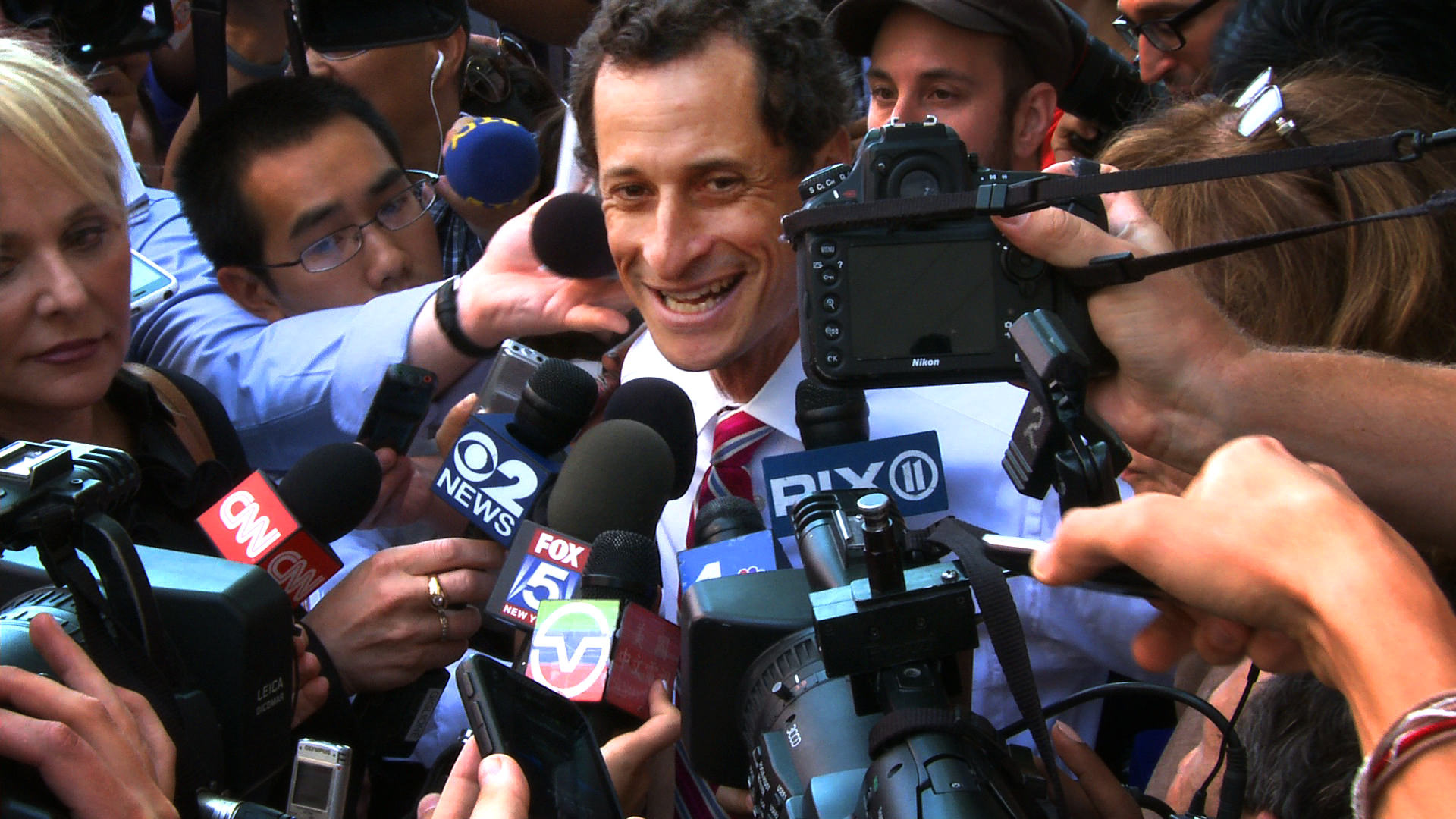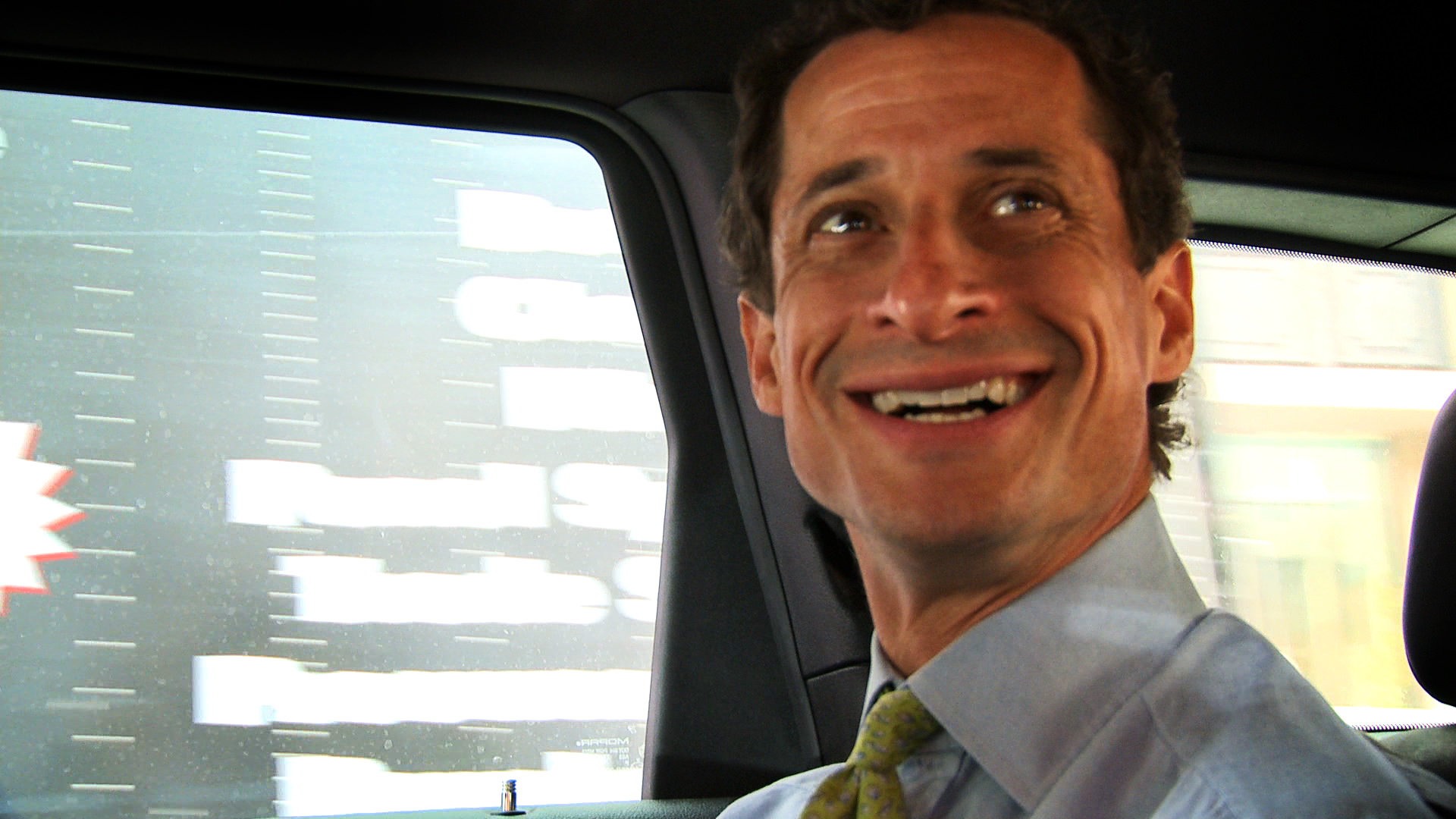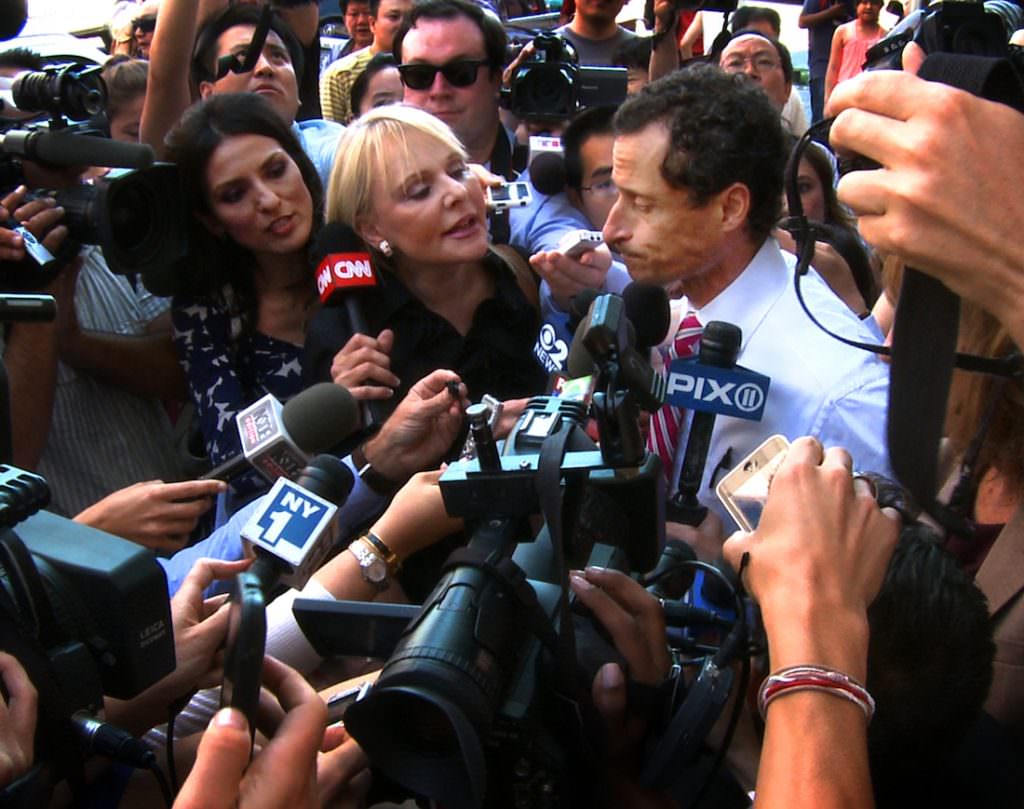Talking to Weiner Directors Josh Kriegman & Elyse Steinberg
When co-directors Josh Kriegman and Elyse Steinberg started making Weiner in 2013, two years after their subject had resigned from the U.S. Congress because of a sexting scandal, Anthony Weiner seemed to be a comeback kid. He was making a second run for mayor of New York, and this time the polls predicted success. Then more embarrassing e-mails and inappropriate cellphone photos surfaced, and Weiner's campaign hit a wall of media derision and voter disgust.
The candidate didn't banish the filmmakers when things went wrong, perhaps because he trusted Kriegman, who had worked for him almost a decade earlier. The documentarian had been friendly with Weiner and his wife, Huma Abedin, who happens to be a longtime top aide to Hillary Clinton. So he and his former boss had remained in touch, Kriegman explained during a visit to Washington with Steinberg a few days after the documentary's May 20 New York debut.
Their interview with The Credits, which has been edited for length and clarity, took place in a hotel suite with a view of White House. Kreigman allowed that he had been surprised when the initial scandal broke, forcing Weiner from his job at the other end of Pennsylvania Ave. That's when Kriegman began thinking about the film.
Kriegman: I had been his chief of staff for a couple of years when he was in Congress. Then after I had moved into filmmaking and was working with Elyse that scandal unfolded. That was actually the point when we started talking to him about the possibility of making a documentary.
I read in one account of this process that you "pestered" him. Is that the term you'd use?
Kriegman: I certainly don't put it that way. Working for him, I had known him as a multi-faceted person. A full person. Then I saw through the course of the scandal and his resignation, how much he became a punch line. So I was eager to see if he might be willing to open up his life and himself to tell a more complete version of this story. I don't know if I pestered him, but we definitely had an ongoing conversation for a couple of years before he finally agreed.
We were pitching him on the idea that there was an important story to be told. I think he was intrigued by that, and understood that. He had lived through this experience of having everything in his almost-20-year career's being wiped out, and being replaced by this caricature of himself.


The fact that you already knew him made it easier in some ways. But was it also harder in other ways?
Kriegman: I don't know. Part of the reason that our partnership worked so well is that I was very close to him and close to the material. I filmed almost all of it myself. But Elyse wasn't. So she had some distance.
Steinberg: One of the things we wanted to do was make a character-driven verite documentary, and Anthony's story was fascinating that way. We were excited about making a film that was not only a nuanced portrait of Anthony, but also about media and politics today.
Kriegman: You also came to the story not knowing Anthony at all.
Steinberg: Yeah. I had these preconceived notions of Anthony that were very much in line with the audience member. But when I met him, and looked through the footage, I realized that he is so much more fascinating and complicated than I had previously thought.
How many hours a day were you spending with him during this time?
Kriegman: The shoot schedule was, show up at his house before he heads off to his first event, and stay with him through the end of the day. It was really all day, every day, as much as I could possibly capture for the four months of his campaign. From the day he announced he was running, to the end.
And then, Elyse, did you look at that day the next day?
Steinberg: We looked through some of the footage as Josh was shooting, but really it wasn't till he was done that we had the time. We hired some co-producers, Sean McGing and Liz Warren, and as an executive producing team Julia Goldman, Carolyn Hepburn, and Christopher Elements, to work with us as we sifted through the material. You have a natural arc, but we wanted to find our story and our style.


How were you keeping track of it as Josh was shooting?
Kriegman: We were basically talking all the time. I would be out in the field, but we'd be in constant contact.
Steinberg: The other thing is that if there were big events, like election day or debate day, we'd get other camera people, and I would go with them. In the beginning, we actually brought another camera person with us. But we realized pretty quickly, both logistically and in terms of the relationship, that it made sense for just Josh to be there.
Kriegman: One of the interesting things was that Elyse got to experience the news as it unfolded. Newspaper headlines and cable news. I was often behind the headlines, with him in the car, or at home, as these things were happening.
Steinberg: Josh might not even have known the way it was being received in the press. I could say, "Look, this is what they're saying. What does it look like there?" And realizing what was important for us to capture.
There must have been someone on the campaign who everyday told the candidate how things were playing in the press.
Kriegman: Oh, yeah. I got to see them monitoring the media. We see some of that in the film.
Did having a camera in front of your face give you some distance when filming people you knew?
Kriegman: Absolutely. There were many intense moments, which were emotional for Anthony and Huma and the staff. And I was right there with them and experiencing some of that. But there is an emotional remove you have as a documentarian in that position.
Your footage entered the news cycle when Weiner got into an argument in a bakery with a man who said something hostile about Huma Abedin.
Kriegman: It was first reported as, Anthony has a meltdown and is totally losing it on the campaign trail. But he had been reacting to this comment that this customer had made, and it wasn't until looking at the footage that I had captured that you could hear the comment. I was happy to offer that up to correct the record. That actually changed the media narrative.
Thematically, that was something we were really excited to show. The way that the story is constructed, and then can completely transform based on this other little piece of information. And then you have the third narrative, which is the behind-the scenes version, in the car afterwards reacting to it.
Steinberg: It's exciting to show that striking difference, not only the public story and the private story. You also get to see Anthony's consuming his own story. It has all these levels that you don't normally get to see in public scandals and celebrity meltdowns.


You didn't hesitate at becoming part of the story?
Kriegman: This was an instance of correcting the record. Because I was on the ground with Anthony, every day through everything, in this instance I was able to capture something that the news cameras missed.
As you said, there's a natural chronological framework. But you edited for a long time.
Steinberg: Yeah. In documentaries, three years actually isn't that long. [laughs] There was also fundraising, and a lot of footage to go through. An election, like a trial — and I did a documentary on the trial of Saddam Hussein — has a natural arc. We knew we had some compelling material, and we wanted to make an entertaining film. But we wanted to avoid easy jokes and stereotypes.
Also, finding our style and our tone is something we worked through. We brought in an amazing editor, Eli Despres, and we wrestled with the story construction.
Reportedly, Anthony Weiner has not seen the film. Were there other people who said they just didn't want to see it?
Kriegman: No. We offered to show it to Anthony, and he hasn't wanted to see it. There are a few staff members, I think, who have seen it. But the film is in theaters.
It is a little painful to watch.
Kriegman: It can be. One of the things we've learned is that people really have this wide range of reactions. That is gratifying in terms of our intentions. We wanted to portray the complexity of these people and the situation. Viewers walk away from this film feeling very different ways. About Anthony, about Huma, about the scandal.
Steinberg: We never know when a person comes up, what they're going to think. It's been gratifying for us. We wanted a discussion. We wanted to raise questions. It's also gratifying that some people see the film's relevance to our current presidential campaign, especially in terms of how spectacle and sensationalism have come to embody some of the media today. You see that being played out with Donald Trump.
Did you consider bringing some sort of expert to try to explain Weiner, psychologically?
Steinberg: I think we discussed it for, like, a quick minute. [chuckles] But we really wanted it be from Anthony's perspective, and the campaign's perspective. We wanted audience members to be on this journey with him, and have them form their own opinion. Not to have an expert tell us what's inside Anthony's head.
Kriegman: There are a lot of different ways to try to explore or explain the story, or Anthony, or the scandal, or the political moment. We considered it. But ultimately we ended up feeling very committed to bringing the viewer through the experience with Anthony.
Were you hoping for a moment in which he becomes more reflective about it?
Kriegman: I think that you do get to see him reflect on how he makes sense of it all. How he's come to terms with it. One of the insights that I think he touches on, which I find interesting, is this idea that some of the qualities that made him so successful in politics are the very same ones that ultimately led to his undoing. He talks about craving attention, and being wired in a way, as all politicians are, to need attention. He mentions thriving in a world of superficial relationships. These are qualities that actually help him in politics, but then maybe made it hard for him to connect on a deeper level. He was engaging in these online relationships as if he was playing a videogame. I think he's, in some ways, surprisingly self-aware.
Not that long ago, it was a widely held political belief that someone from New York could not run for president. Now we have two front runners, Donald Trump and Hillary Clinton, who are more or less New Yorkers, as well as Bernie Sanders. And Weiner has a New York style that certainly recalls Trump.
Steinberg: We have seen some of the parallels between Anthony and Trump. I think they're very different, politically and personally. But I do think that both understood that, in order to have a voice in today's 24-hour news cycle, you need to put on a show. By being brash, and having an air of authenticity, you can get attention. I think there is something New York about telling it like it is, of having that kind of persona that you can see in our film.
Kriegman: His New York style is so much of what made him successful. I think this does relate to Trump. I think that Anthony — and he acknowledges this — understood the theatrics of politics today. He was good at figuring out how to go viral on YouTube, and performing on cable news. He knew how to use those tools in the pursuit of his agenda, which I think was an authentic agenda, one that he genuinely believed in. There's a real parallel there to what Trump has been able to do.




